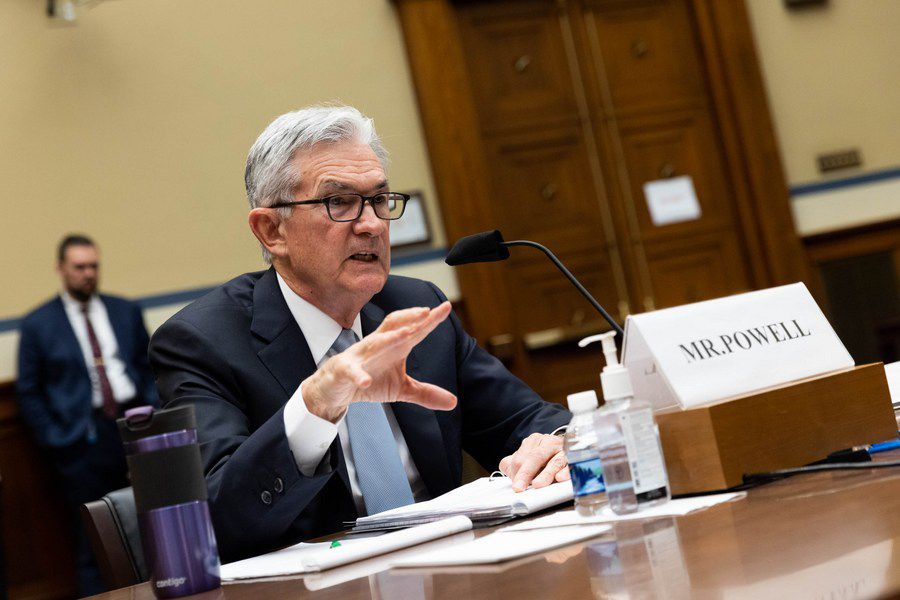Amid inflation pressures, Powell says U.S. economy "still a ways off" from tapering asset purchases

U.S. Federal Reserve Chairman Jerome Powell testifies at a hearing before the House Select Subcommittee on the Coronavirus Crisis on the Federal Reserve's Response to the Coronavirus Pandemic in Washington, D.C., the United States, on June 22, 2021. (Xinhua/Graeme Jennings)
Economist Diane Swonk said that Fed Chair Jerome Powell's testimony sticks to his script on patience in policy, arguing that the current surge in inflation and labor market friction are likely transitory, but the door is left open to changes in policy.
WASHINGTON, July 14 (Xinhua) -- U.S. Federal Reserve Chair Jerome Powell said Wednesday that the U.S. economy is "still a ways off" from the progress that the Fed wants to see before tapering asset purchases, while the central bank is monitoring inflation very carefully.
"At our June meeting, the (Federal Open Market) Committee discussed the economy's progress toward our goals since we adopted our asset purchase guidance last December," Powell said at a hearing before the House Financial Services Committee.
"While reaching the standard of 'substantial further progress' is still a ways off, participants expect that progress will continue. We will continue these discussions in coming meetings," Powell said, adding the Fed will provide advance notice before announcing any decision to make changes to asset purchases.
The Fed has pledged to keep its benchmark interest rates unchanged at the record-low level of near zero, while continuing its asset purchase program at least at the current pace of 120 billion U.S. dollars per month until the economic recovery makes "substantial further progress."
Asked about what "substantial further progress" looks like, Powell said it's "very difficult to be precise" about the term as it's hard to measure the progress towards maximum employment, one part of the Fed's congressional mandate.
"It really is a very broad range of things, including wages, unemployment, levels of employment, participation, all those things," he said, adding Fed officials will "have another round of discussions on this very topic" at the Fed's meeting in two weeks.

People dine at a restaurant in Washington, D.C., the United States, July 13, 2021. (Xinhua/Liu Jie)
In its semi-annual monetary policy report submitted to Congress last week, the Fed said that the COVID-19 pandemic continues to weigh on the U.S. economy and the labor market, reiterating the central bank will maintain its ultra-loose monetary policy to support the economy.
Powell also noted that the incoming inflation data "have been higher than expected and hoped for."
"But they're actually still consistent with what we've been talking about that the very high inflation readings are coming from a small group of goods and services that are directly tied to the reopening of the economy," he said, adding the central bank is monitoring the situation very carefully.
"If we were to see that inflation remaining high and remaining materially higher above our target for a period of time and that it was threatening to uproot inflation expectations and create a risk of a longer period of inflation, then we would absolutely change our policy as appropriate," he said.
Diane Swonk, chief economist at Grant Thornton, a major accounting firm, said Wednesday that Powell's testimony sticks to his script on patience in policy, arguing that the current surge in inflation and labor market friction are likely transitory, but the door is left open to changes in policy.
"The uncertainty is greatest around inflation expectations &whether they can remain anchored enough to allow inflation to abate or whether they will move even higher. This is where the Fed would pivot and hit the brakes more aggressively if their analysis is wrong," Swonk said on the Twitter.

People dine at an outdoor area of a restaurant in San Francisco, California, the United States, June 15, 2021. (Xinhua/Dong Xudong)
U.S. consumer prices jumped 0.9 percent in June, recording the largest one-month increase and largest 12-month increase in roughly 13 years, the U.S. Labor Department reported on Tuesday.
Over the last 12 months, the consumer price index soared 5.4 percent, the largest 12-month increase since a 5.4-percent increase for the period ending August 2008, according to the Labor Department.
A Fed survey released Wednesday showed that the U.S. economy strengthened further over the past two months amid supply constraints and price pressures.
"Supply-side disruptions became more widespread, including shortages of materials and labor, delivery delays, and low inventories of many consumer goods," the Fed said in its latest survey on economic conditions, known as the Beige Book, based on information collected from its 12 regional reserve banks.
The survey also showed that prices increased at "an above-average pace" across the country, as seven Fed districts reported strong price growth and the rest saw moderate gains.
While some business contacts felt that pricing pressures were transitory, the majority expected "further increases" in input costs and selling prices in the coming months, according to the survey.
Photos
Related Stories
- Commissioner's office of Chinese foreign ministry in HKSAR urges U.S. side to stop misleading political theater
- Commentary: U.S. poses gravest threat to peace in South China Sea
- Suspect dead, 2 officers injured following shooting at mall near U.S. city of Baltimore
- U.S. budget deficit soars to 2.24 trln USD in first nine months of fiscal year 2021
- Commentary: Suppressing China won't help U.S. tech vitality
Copyright © 2021 People's Daily Online. All Rights Reserved.










